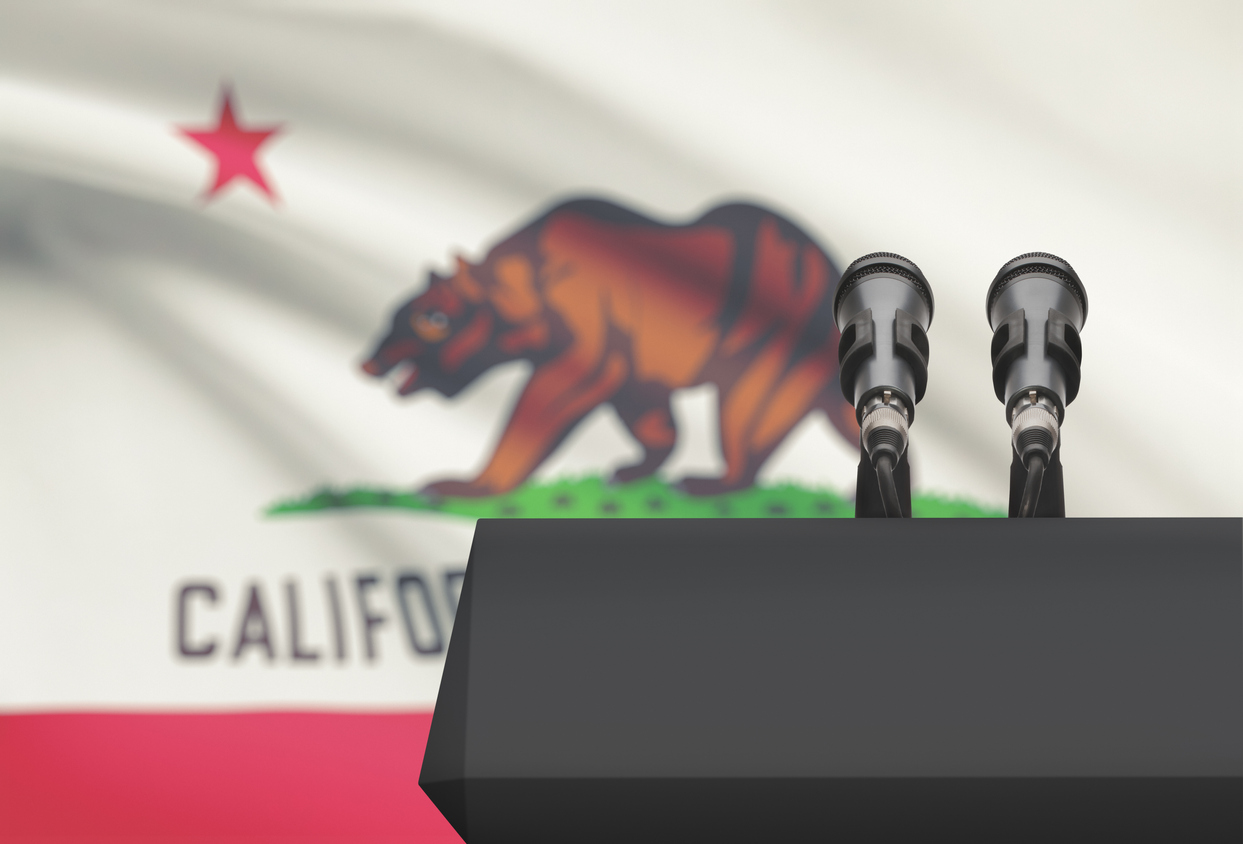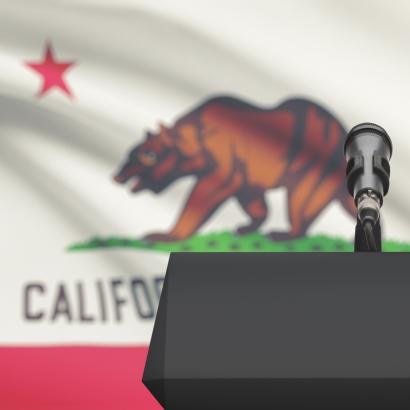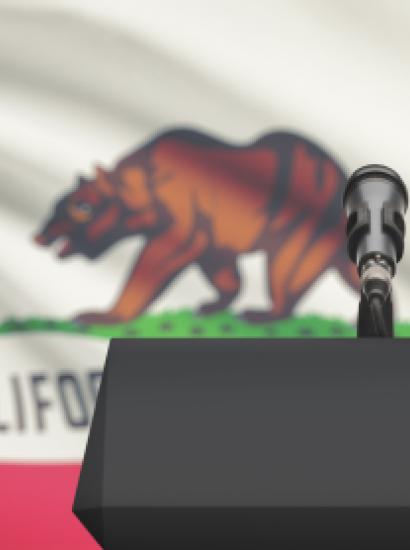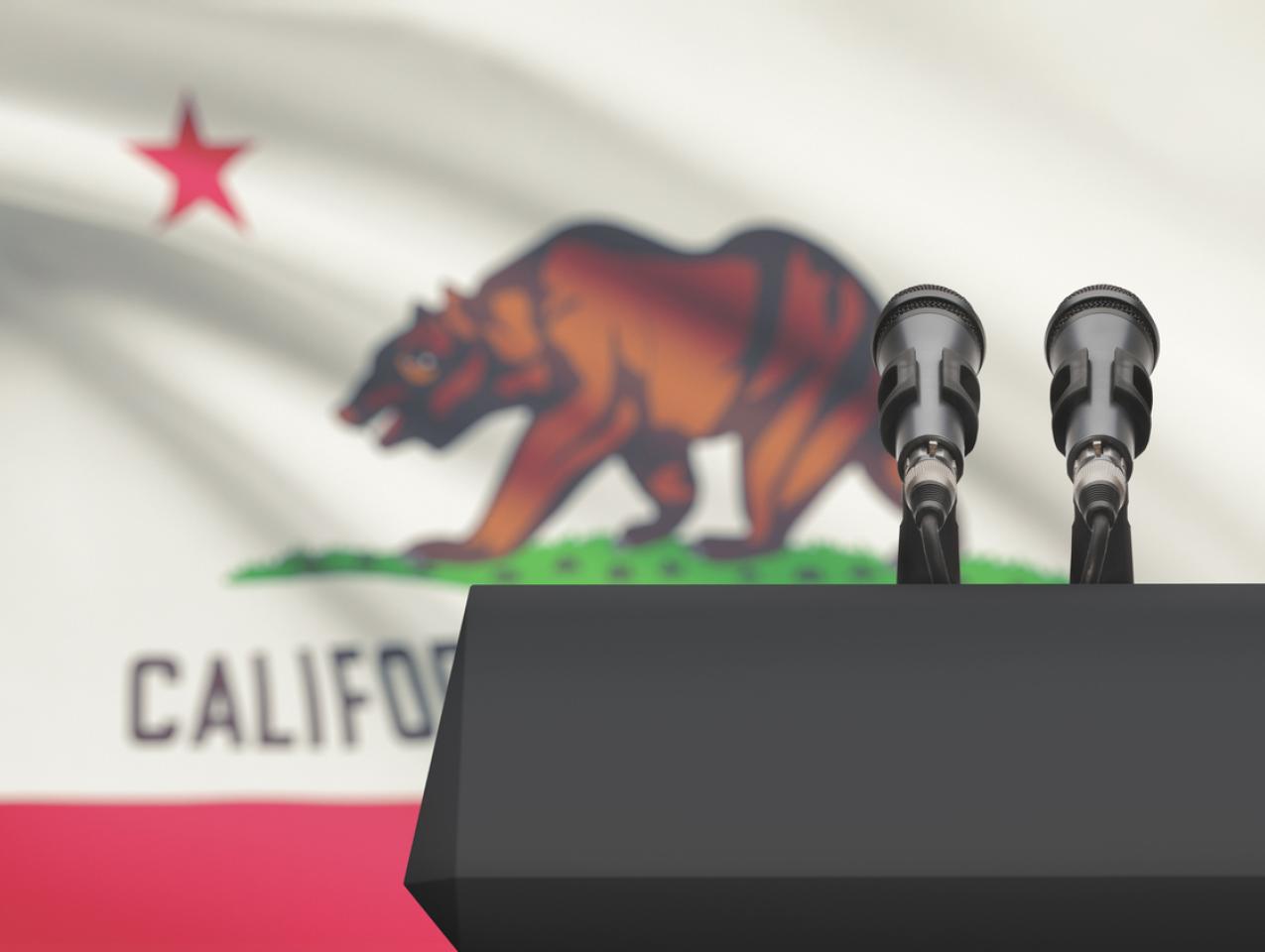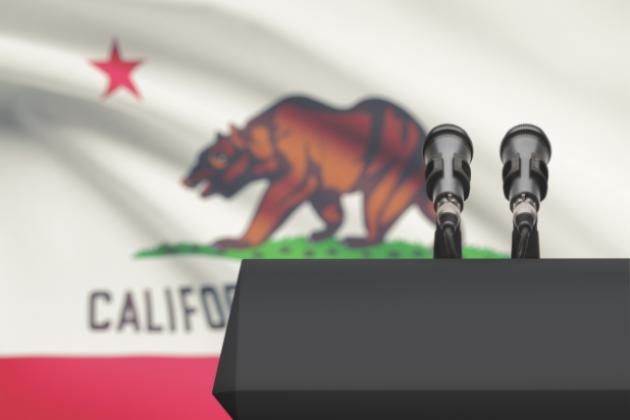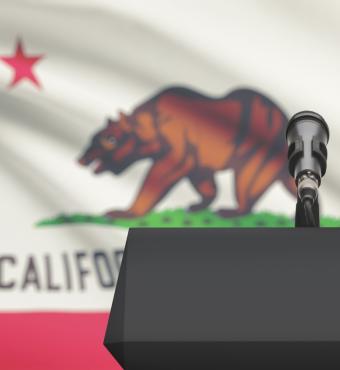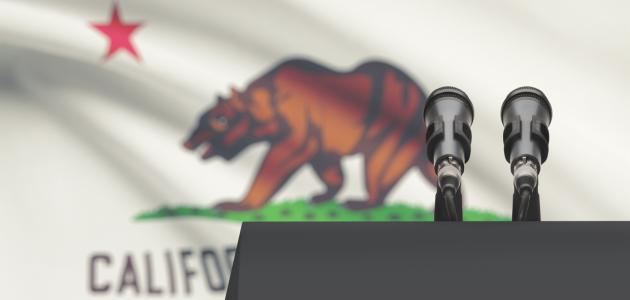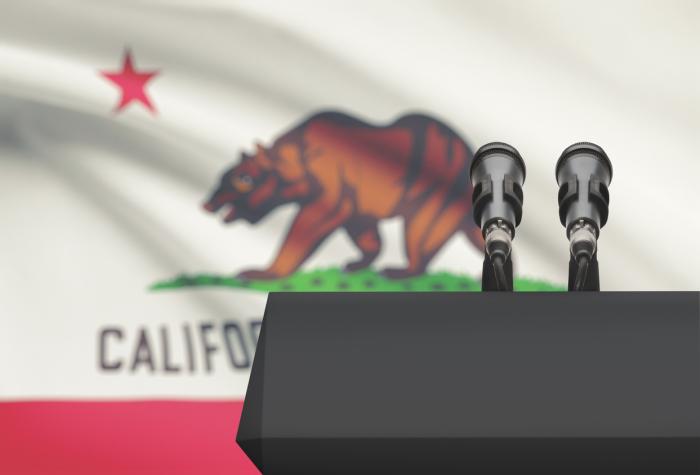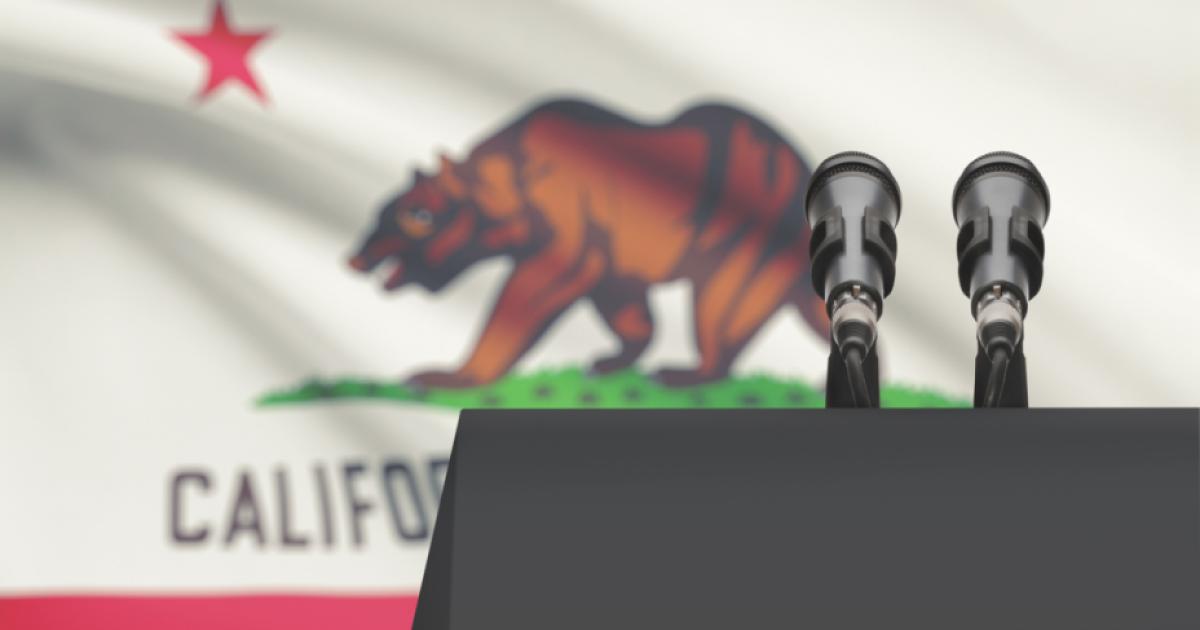The second Republican presidential debate of the 2024 campaign season gets under way later today at the Ronald Reagan Presidential Library in Simi Valley, roughly an hour’s drive northwest of Los Angeles.
As that makes this a California-based debate, at the final resting place of the last Californian to win the presidency, here are a few California-related topics for the assembled candidates to ponder.
1. Why Did California and Republicans Part Ways? In 1984, Ronald Reagan’s reelection campaign produced this wall poster, featuring a brimming president sporting his trademark cowboy hat. The red, white, and blue caption: “America: Reagan Country.”
Forty years ago, California arguably was Republican country—GOP presidential candidates won eight of the nine presidential elections spanning 1952 to 1984; GOP governors (beginning with Reagan) managed the Golden State for 24 of the 32 years spanning 1967 to 1999.
But that was then, this is now. Democrats currently control every statewide and state constitutional office in the Golden State; California hasn’t opted for a Republican presidential or US Senate candidate since 1988, Reagan’s last year in office.
The question for the candidates: to paraphrase a Reagan line about his parting ways with the Democratic Party, did Republicans leave California, or did California leave the modern Republican Party?
2. Is a 10% Tariff Terrific or Terrifying? For a second straight GOP debate, former president and 2024 frontrunner Donald Trump isn’t expected to take part. But that doesn’t mean Trump policy suggestions should be off the table.
As far as California and its world-class economy is concerned, there’s no better place to start than Trump’s call for a 10% tariff on virtually all imports into America—in Trump’s words, “a ring around the US economy.”
Why this topic? Because of the significance of California’s import trade ($508.75 billion in 2022, an increase of 8.17% from the previous year, according to the US Department of Commerce), not to mention the depth of California exports (a record $185.55 billion in 2022). Leading the way among exported commodities: computer and electronic products (22.4%), nonelectric machinery (11.7%), and chemicals (9.5%).
For the Golden State, the question of Trump and tariffs is a matter of “been there, done that” . . . without particularly enjoying it. Back in 2019, after Trump imposed a 25% tariff on Chinese imports, California was one of three states hit hardest when weighing imports as a percentage of state GDP, according to a JPMorgan analysis.
Question(s) for the candidates: Do you support the new Trump tariff? If so, and in order to avoid full-blown trade wars, how will you work with the governments of Mexico, Canada, China, Japan, South Korea, Taiwan, the Netherlands, Germany, India and Hong Kong (in order, California’s top export partners)?
3. As California Votes . . . So Should America? While we’re on the topic of Trump hobbyhorses, a California-based debate raises the question of California’s innovative approach to voting—with an emphasis on mail-in ballots and a generous early-voting window—versus Trump’s historic distrust of such innovations.
In the Golden State, all active registered voters receive vote-by-mail ballots as soon as a month before the election. What comes next: a tsunami of nearly 22 million ballots that county election officials have to process (and validate) in the days and weeks after the polls close. Which means one thing: dancing numbers as the vote count changes.
The problem for the GOP heading into the 2024 election: Trump’s mixed message on early voting. While he recorded this video earlier this summer encouraging Republicans to vote early, he’s also spent the better part of the last three years trying to convince the public that election fraud cost him the 2020 election. (According to this recent CNN Poll, two in three Republicans think Trump was cheated.)
Question for the candidates: If early voting is the way of the future, as at least one prominent Republican governor seems to believe, should all states install California’s system of universal voting by mail, “ballot harvesting,” and no voter-identification requirements?
4. Breaking Up (Big Tech) Is Easy to Do? In Trump’s absence, Florida governor Ron DeSantis is the debate’s “front-runner” in that he runs a very distant second to Trump in most national polls.
The debate’s moderators could take the obvious route and ask DeSantis’s rivals where they stand with regard to his many clashes with the California-based Walt Disney Company—what started as a squabble over a Florida education bill, then land autonomy, and is now a federal lawsuit (Disney’s corporate headquarters in Burbank are less than an hour’s drive from the Reagan Library).
I’d take the debate in a different direction: what the federal government could or should be doing to curb Big Tech (DeSantis reportedly suggesting, two years ago and in private, that Google “should be broken up”). Do DeSantis’s rivals agree or disagree?
While we’re on the tech front, here are two other California-related questions. First, what do the candidates think of Elon Musk and the Golden State going to war over content moderation (as Musk, the owner of the social platform formerly known as Twitter, has sued California’s state attorney general over a year-old law requiring social media companies to disclose how they define “hate speech” and “disinformation”)? Second, and taking us back to Google, what are the candidates’ thoughts on the Republican National Committee’s lawsuit accusing the tech giant of misdirecting GOP email messages to users’ spam folders during the peak of last year’s midterm election (a federal judge ruling last month that Google was protected by Section 230 of the Communications Decency Act)?
5. Hooray for Hollywood? In early 1960, the last time there was a “double strike” of actors and film/TV writers as there is at present, then actor Ronald Reagan was in the front ranks of the battle as president of the Screen Actors Guild.
It makes for a point of presidential irony. While Reagan’s firing of 11,000 striking air-traffic controllers in the first year of his presidency is remembered as one of his bolder moments in office, it’s worth noting that Reagan is also the only union president to serve as an American president.
Why this is relevant to the current field of Republican hopefuls: the question of when a president should intervene in a labor dispute, as did Bill Clinton in the 1994–95 Major League Baseball strike (Clinton first appointed a “super mediator” to work with owners and the players’ union, to no avail, and then called on Congress to end the impasse by imposing binding arbitration).
Questions for the candidates: Would you have offered mere lip service or have actually intervened in the five-month Hollywood strike? Would you ever walk a picket line, as President Biden did yesterday in Michigan, in a show of solidarity with striking autoworkers? (Note: for the two South Carolinians on the stage—former governor Nikki Haley and Senator Tim Scott—their responses should read like an ad for the right-to-work Palmetto State, attracting the likes of Boeing and other companies looking to expand or relocate.
6. Reagan’s “11th Commandment.” Finally, as this is a debate being staged in a memorial to Ronald Reagan, let’s ponder the question of how the former president would be treated were he one of the 2024 contenders—i.e., would his rivals honor what Reagan called the “11th Commandment” (“thou shall not speak ill of another Republican,” a sentiment Reagan attributed to Gaylord Parkinson, the California state GOP chair during the time of Reagan’s first gubernatorial run)?
It wouldn’t take much effort for an oppo researcher to dredge up the following from Reagan’s Sacramento days as California’s 33rd governor:
- He signed off on what was at the time the largest tax increase in California history to offset a deficit inherited from his predecessor (the sales tax going from 3% to 4.75%; corporation taxes nearly doubling from 5.5% to 9%; and the maximum on personal income taxes rising from 7% to 11%).
- He signed the California Environmental Quality Act (CEQA), requiring state and local agencies to identify significant environmental impacts of their actions. While that may sound harmless, CEQA has proved to be an impediment to both home construction and keeping California green.
- And he signed 1967’s Therapeutic Abortion Act that broadened access to the procedure to before the 20th week of pregnancy in cases of rape or incest, to protect the mother’s physical or mental well-being, or in cases of statutory rape involving girls under 15 (nine years late and running for president, Reagan termed his decision a “mistake”).
The point of listing these decidedly “non-conservative” actions: Reagan, as a former governor, would go on to landslide victories in two national elections (winning 93 of 100 states, counting both sets of results in 1980 and 1984). Question for the candidates: Does Reagan’s lesson show the silliness in engaging in ideological purity tests?
If you’re watching tonight, enjoy the debate.







